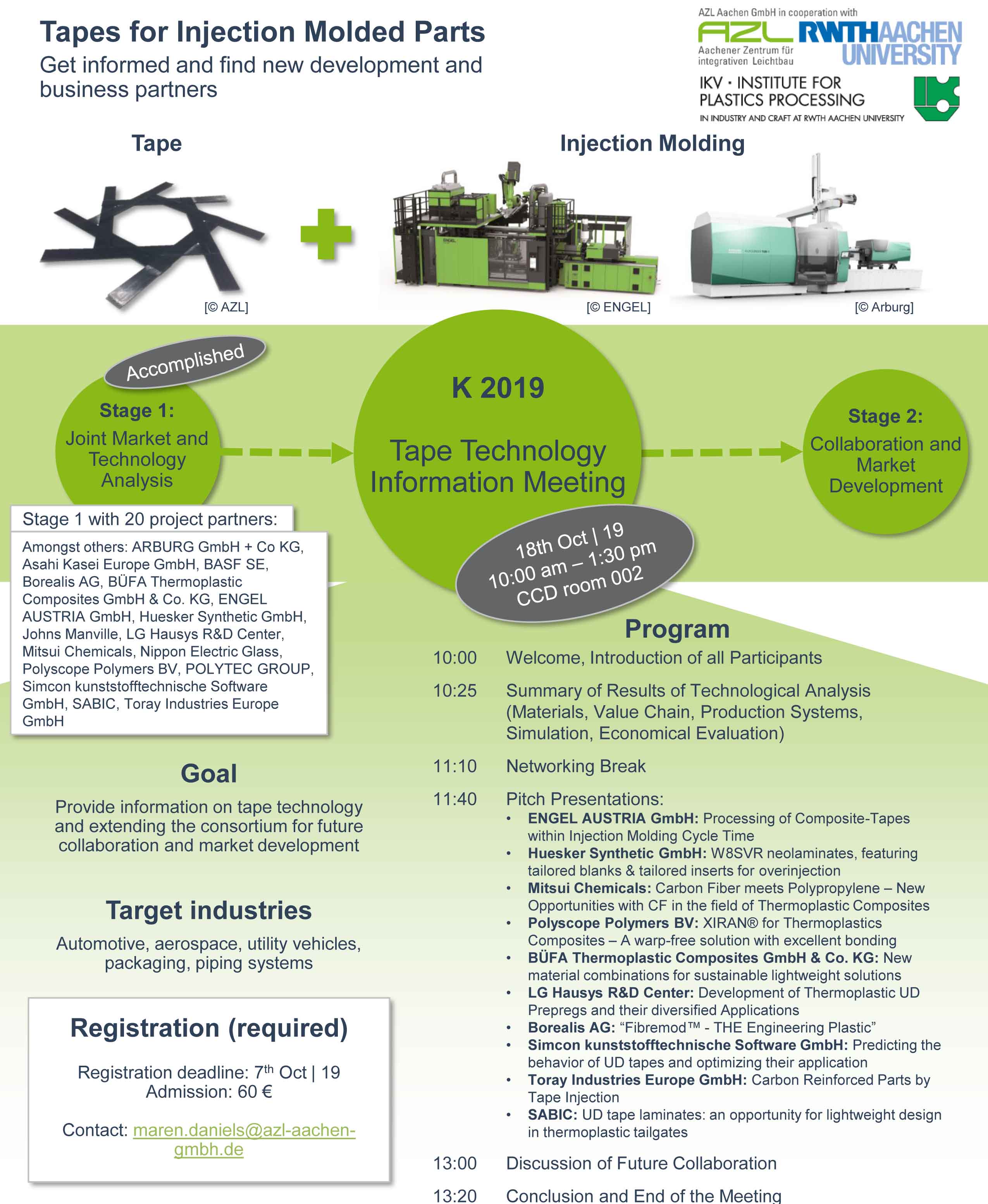
AZL Aachen GmbH in cooperation with Aachen Center for Integrative Lightweight Production (AZL) of RWTH Aachen University
Following the finalization of a major consortial project led by the Aachen Center for Integrative Light-weight Production (AZL) and the Institute for Plastics Processing at RWTH Aachen University (IKV), the result is clear: tape inserts offer enormous potential for injection molding parts.
For suitable components, product costs and component properties can be positively influenced. “We are so satisfied with the progress and results of the study that we have already defined several follow-up projects and are also forming a consortium for the short-term identification and implementation of new applications,” explains Prof. Christian Hopmann, founding professor of the AZL and head of the IKV. Both the previous results and the planned follow-up projects are the subject of the “Technology Information Day” at K 2019, to which the companies involved in the study, the AZL and IKV, invite all companies along the value chain, from raw material manufacturers to injection molders to OEMs. (Date: 18th October 2019, 10:00 am to 1:30 pm, Trade Fair Düsseldorf CCD South, Room 002).
In cooperation with 20 industrial partners, the two renowned Aachen research institutes AZL and IKV carried out a detailed analysis of tape inserts in injection molded components over a period of eight months. The tapes, which are a few tenths of a millimeter thick, are continuous fibers, typically made of glass or carbon, completely impregnated and embedded in a thermoplastic matrix. The tapes can be precisely aligned to the loads in a component and are used primarily in high-performance applications with the aim of weight reduc-tion. The aim of the conducted analysis was the identification of potential applications and the estimation of a wider range of applications. “We know that the integration of small amounts of high performance tapes into typical injection molded parts can contribute significantly to material savings in their manufacture. Lightweight construction is only a secondary effect, one of the main drivers for establishing the technology is cost reduc-tion,” says Dr. Kai Fischer.
The project was divided into several phases: Phase I was used to identify the current status. In 20 interviews with representative companies of the injection molding industry, the researchers gathered why tape inserts have rarely been taken into account so far, when defining the material concepts to be analyzed. The lack of information about the material class, the procedure and tools for the development process and the necessary production technologies were cited as major challenges. This is where the consortium will take action and provide comprehensive information during the “Technology Information Day” on the extensively prepared state of the art and the high degree of maturity of the supply chain. Based on the status quo, they developed a methodology for analyzing the technological and economic potential of tape inserts in injection molding applications. “Our analysis clearly underlined the potential of the tape inserts. With them, the material perfor-mance can be increased. Therefore, component costs can be saved by using cheaper injection molding compounds or less material or by optimizing the cycle time of the production process,” Dr. Michael Emonts summarizes the promising results. “It is also advantageous that the process sequence with tape inserts is certainly comparable with in-mold labelling processes, so that some existing automation technology can be used”.
The consortium, amongst others consisting of Asahi Kasei Europe GmbH, BASF SE, Borealis AG, BÜFA Thermoplastic Composites GmbH & Co. KG, ENGEL AUSTRIA GmbH, Huesker Synthetic GmbH, LG Hausys R&D Center, Mitsui Chemicals, Nippon Electric Glass, Polyscope Polymers BV, POLYTEC GROUP, Simcon kunststofftechnische Software GmbH, SABIC and Toray International Europe GmbH, is inviting to the “Technology Information Day” at K 2019. The goal is to inform about the technology and to identify topics for future collaboration. The event will also be a platform for bringing together partners to develop the market and to cooperate within technological development projects.
Applications are accepted by Maren Daniels (maren.daniels@azl-aachen-gmbh.de).

About AZL:
RWTH Aachen University is one of the worldwide leading universities in the field of production technology. The Aachen Center for integrative Lightweight Production (AZL) of RWTH Aachen consolidates the light-weight expertise of eight partner institutes with 750 scientists on the RWTH Campus. Furthermore, in coop-eration with the AZL Aachen GmbH, the AZL institute has built up an international partner network between these institutes and more than 80 international companies form 21 different countries involved in lightweight production. For this, AZL consists of two separate entities: The AZL of RWTH Aachen University addresses the transformation of lightweight design in mass production with basic research and development of light-weight products, materials, production processes and systems with access to the latest full-scale machines and automation systems. As a service provider partnering with companies in the field of lightweight production technology, AZL Aachen GmbH provides industrial services in the areas of engineering, consultancy and project management, networking and business development. With the AZL Partnership, the AZL Aachen GmbH enables the close cooperation between the lightweight industry and the research institutes of RWTH Aachen Campus along the whole value chain. The AZL Partner Network consists of more than 80 industrial partners representing the entire lightweight production value chain from the raw material producer, over mold-ers, manufacturing equipment suppliers, Tier 1 and Tier 2 to OEMs, from SMEs to large multinational corpo-rations, from Germany to Mexico, China or Japan, from 21 different countries in total.